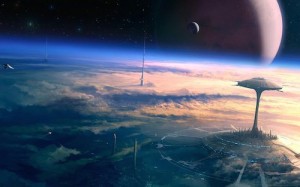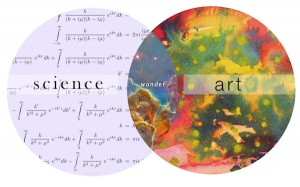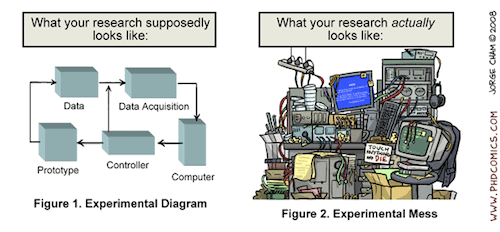by Naomi L. | April 17, 2015 | Flash Fiction, J.C. Wolfe's Writing |
(What If? Exercise: Read the description here.)
She ran as fast as she could, faster than she knew she could, faster than she had ever run in her life, down the hill, into the forest, past the young saplings she hardly knew toward the old towering oaks she had known as a cub, the same oaks she hoped would be a haven to her own cubs, the beloved litter of four she had carried for nearly two months and for whom she had traveled so far to find food, for whom she had almost found a hearty meal until the dogs had sent her fleeing, the very dogs who had made of her a widow since the day they had torn her mate apart and their men had mounted his beautiful red tail on their wall, leaving her to raise four hungry pups on her own, pups who desperately needed her to survive this chase and make it home alive, and the thought of their innocent faces put a spring in her heels as she sprinted from the sounds of barking and hooves pounding on the cold hard earth, leaving them farther and farther behind in the evening mist, until at last she heard nothing but her own breathing and the rustling of leaves under her paws, and before she knew it, she was diving headfirst into the safety of her den and the warmth of her children’s tiny bodies huddling around her, exhausted yet relieved that they might have a chance to see the coming of another spring.
This story is based on What If? Exercise 90: “The Journey of the Long Sentence”. The exercise is to write a short short story that’s only one sentence long. The objective is to understand how we can shape our writing in a similar manner that our minds function, building a linear order for observations that often consist of many overlapping aspects. I hope you enjoy what I’ve written. Thanks for reading!
Back to the story
by Naomi L. | April 15, 2015 | Blog, Creative Writing |
Back to the subject of art and science! Since starting a discussion on this topic last month, I’ve already talked about the reading and writing aspects of the comparison between art and science. Now I’m inspired to get into another topic that has held my interest for as long as I can remember: research. How do these two sides compare when it comes to looking things up?
How the Art is like the Science
Research is a technique that every serious writer must master, regardless of medium. Scientists need to acquire purely factual information to form a solid foundation of credibility for their studies and continuously guide their work toward new discoveries. Journalists have to be aware of all the facts of a story in order to accurately convey the news to their readers/viewers. Even fiction writers and poets draw ideas from real life to paint a vivid image with the details in their stories and poetry. No matter what we choose to write, we should always do at least a little research to make our work believable, and that’s why the best writers do well to keep reference books, articles, and search engines handy at all times.
What makes most literature relatable is that no matter how fantastic the details may be, there’s always some base of truth with which the reader can connect, whether it’s the spectrum of emotions shown by fictional characters or world news that directly or indirectly affects us. As writers, it’s up to us to curate the ideas we want to share with our audience and present them in a way that makes our writing fresh and interesting, for fiction and non-fiction alike.
Research is a universal term for looking up information that we can put to good use. The differences, however, lie in the purposes of this practice…
How the Art is unlike the Science
Artistic writing is widely popular as an escape from reality for the fascinating stories one can only find in fiction. That being said, a writer can’t expect for more than a handful of readers to enjoy their work unless they can somehow bridge the gap between the fictional world of their stories and the real world of their audience. This is where research plays a key role. Writers of historical fiction have to know as many specific details as possible of the past events around which they construct their tales. Science fiction writers should have at least a basic understanding of real scientific principles before attempting to pass their stories off as even remotely plausible. Murder mysteries and thrillers rely on plots that could happen in real life in order to achieve their full effect, and romance novelists need to understand human nature and relationships if they want to make their characters relatable. Research is important for all forms of artistic writing, and fiction writers who master it will find their craft all the more enriching for it.
Scientific writing, on the other hand, thrives on research taken to a whole other level. While research for writing may be optional for many artists, it is unequivocally mandatory for scientists. Not only are we expected to read everything related to our field of interest, but we have to do so before we even think about writing our own work! If I learned anything from my first years as a Biology student, it’s that you can’t expect to make it in the scientific community unless you’re constantly reading. Academic papers, books, news articles, any source of information relevant to your studies can and should be perused. Science is all about the progression of knowledge, and in the modern age of the Internet, new information is emerging faster than ever: every week, in fact, if not every single day. In short, research is an enhancement that artists choose to pursue, but lack of research is a hindrance that scientists cannot afford.
Like many aspects of writing, research is something of an art and a science itself. It may not be easy for every writer to acquire the habit, but once you get the hang of it, you’ll find that research is an invaluable practice that will help you connect with your readers and elevate your writing to wonderful new heights. Best of luck! Thanks for reading!
by Naomi L. | April 13, 2015 | Blog, Word of the Week |
Word: abysmal
Pronunciation: ə-BIZ-məl
Part of Speech: adjective
Definition: extremely bad; appalling
Source: Oxford Dictionaries
Man, this is bad. And I’ve had my share of bad reviews. I still remember my first good one, though. “Everything else in this production of Our Town was simply terrible. Joey Tribbiani was abysmal.”
– Joey Tribbiani, Friends (Season 8, Episode 21 – The One With The Cooking Class)
While we’re on the subject of vocabulary used on Friends, why not take the opportunity to learn another word from Joey? Interestingly, the first time I remember hearing the word “abysmal” was in a case where it was being used incorrectly. While everyone is reading a terrible review of Monica’s restaurant in the newspaper, Joey comments that among all the negative reviews he’s ever received on his acting, he distinctly remembers his first positive one. However, he quickly makes it clear that he has no idea what the critic meant by “abysmal”, for the comment he thinks is that his performance was the best thing in the play is actually that it was the worst.
Anything considered “abysmal” is awful or of extremely poor quality. This informal word dates back to the early 19th century as the adjective form of the noun “abysm”, a literary term for “abyss”. The latter word comes from the Latin noun abyssus “bottomless pit”, which in turn is derived from the Greek adjective abussos, meaning “bottomless” or “without depth”.
Aside from its common meaning, “abysmal” can also be used as a literary term for “very deep”. This definition is relatively rare in modern use, though, so you may not see it much in this sense except in very specific contexts, such as in poetry about the sea. In any case, it’s safe to assume that whatever is described as “abysmal” is being portrayed in a negative light, so be sure to keep that in mind the next time you need to define something horrible in your stories. The important thing is that your readers don’t consider your work itself “abysmal”! Good luck!
What are your thoughts on this word? Any suggestions for future “Word of the Week” featured words?
by Naomi L. | April 10, 2015 | Flash Fiction, J.C. Wolfe's Writing |
(What If? Exercise: Read the description here.)
Mama said not to touch the cookie jar. I should have listened.
I only meant to take one. I didn’t think the jar would be so heavy.
I tried not to cry while Papa yelled at me in the kitchen. It was scary how his angry voice always carried through the house. The whole time, Mama was there cleaning up the porcelain shards and cookies scattered across the floor. She never said a word.
Papa sent me to my room, said I would stay there for the rest of the week. Only when I closed the door behind me did I finally open my right hand, where the stolen cookie rested half-broken in my palm. I’ll never forget eating it.
I remember the sweet smell of day-old dough as I finally heard Mama’s voice downstairs, telling Papa he had been too hard on me. I remember the taste of oatmeal filling my mouth as he yelled that she was always too soft with us. I remember the crunch of hard chocolate chips between my teeth as the shouting and crying grew louder. I remember swallowing the final bite just as the sounds of crashing and shattering glass pierced the night. And I remember picking the last crumbs off my shirt as I heard the front door slam. Salty tears marred the sweetness of the chocolate as Mama’s sobbing echoed through the house, the only sound I would remember hearing for the rest of the night.
It’s been five years since Papa left. I haven’t had a cookie since.
This story is based on What If? Exercise 41: “Peter Rabbit and Adam and Eve: The Elements of Plot”. The exercise is to write a story using four basic plot elements: a prohibition, doing the prohibited, personal/immediate consequences, and long-term/authority consequences. The objective is to become aware of common patterns in storytelling and to understand the importance of basic elements that underlie plots. I hope you enjoy what I’ve written. Thanks for reading!
Back to the story
by Naomi L. | April 8, 2015 | Blog, Creative Writing |
After starting a set of posts on the comparison between artistic and scientific writing, today I’d like to take a break to discuss a related topic that’s been on my mind for a while: science fiction. With all the brainstorming I’ve been doing regarding science and art, I figured now would be the best time to talk about why I love the intersection between the two so much. So on that note, here is a brief list of reasons why I love science fiction. Enjoy!
1) It reconciles my two great passions: science and art.
 As I’ve made all too clear by now, both science and art fascinate me immensely. I’m incredibly proud to be able to call myself a scientist and an artist, so their crossover area is basically my playground. It stands to reason, therefore, that science fiction is right up my alley. Combining elements of both worlds, sci-fi stories appeal to my artist side for the creative reimagining of our universe and to my scientist side for the exploration of the potential in real scientific theories. For someone like me who practically lives in this intersection, it doesn’t get much better than that.
As I’ve made all too clear by now, both science and art fascinate me immensely. I’m incredibly proud to be able to call myself a scientist and an artist, so their crossover area is basically my playground. It stands to reason, therefore, that science fiction is right up my alley. Combining elements of both worlds, sci-fi stories appeal to my artist side for the creative reimagining of our universe and to my scientist side for the exploration of the potential in real scientific theories. For someone like me who practically lives in this intersection, it doesn’t get much better than that.
2) It stimulates real scientific thinking.
One thing I notice whenever a major sci-fi movie comes out is a surge in discussions – both online and off – about how realistic it is. With films like Gravity and Interstellar comes a rise in articles and social media posts by actual scientists explaining the real workings of physics in outer space and pointing out the common inaccuracies in these movies. The same thing happens (albeit to a lesser degree) with stories about other scientific themes such as time travel, dystopian futures, robot uprisings and zombie apocalypses. And I, for one, love having those discussions with my friends and fellow academics. As a writer, I have nothing against a little artistic license, but as a biologist, I encourage the clarification of facts to make sure the truth isn’t buried too far beneath the fiction. As I like to think of it, ignorance is bliss, but knowledge is power.
3) It’s the ultimate “What if?”
I’m sure by now it’s only too obvious that “What if?” is my favorite type of writing-related question. I love imagining what sorts of stories could play out around a single major condition, and no genre can pique that curiosity like science fiction, because changing one detail means altering the entire universe as we know it. What if there’s intelligent life on other planets? What if computers had the intellectual capacity of humans? What if there were a virus that could turn people into zombies? Writing science fiction is like creating infinite parallel worlds with incredible possibilities, all with the power of our minds! How cool is that?
4) It unites people like no other genre can.
Some may not necessarily see this as a good thing, but I’ve always found it interesting how sci-fi has this indomitable power to bring people with similar interests together in a way that no other genre of fiction can. I make no secret of being a so-called nerd and proud of it, so knowing there are tons of people out there who also embrace that eccentric side of themselves is heartwarming. Science fiction offers a unique common ground for those of us who choose to occasionally forget this world and explore the possibilities contained within alternate realities. And if we can share that passion with each other, that makes our love of sci-fi all the more enjoyable.
5) It’s fun to indulge in!
For all the above reasons and more, science fiction is fun, as much to read and watch as to write. I love getting lost in alternate worlds, and sci-fi offers that escape in so many different flavors that I sometimes wonder how I manage to tear myself away from it long enough to face reality again. I could spend hours indulging in these fascinating stories, so if you appreciate science and art like I do, science fiction is definitely the genre for you! Enjoy!
What about you? Why do (or don’t) you like science fiction?



 As I’ve made all too clear by now, both science and art fascinate me immensely. I’m incredibly proud to be able to call myself a scientist and an artist, so their crossover area is basically my playground. It stands to reason, therefore, that science fiction is right up my alley. Combining elements of both worlds, sci-fi stories appeal to my artist side for the creative reimagining of our universe and to my scientist side for the exploration of the potential in real scientific theories. For someone like me who practically lives in this intersection, it doesn’t get much better than that.
As I’ve made all too clear by now, both science and art fascinate me immensely. I’m incredibly proud to be able to call myself a scientist and an artist, so their crossover area is basically my playground. It stands to reason, therefore, that science fiction is right up my alley. Combining elements of both worlds, sci-fi stories appeal to my artist side for the creative reimagining of our universe and to my scientist side for the exploration of the potential in real scientific theories. For someone like me who practically lives in this intersection, it doesn’t get much better than that.
Recent Comments